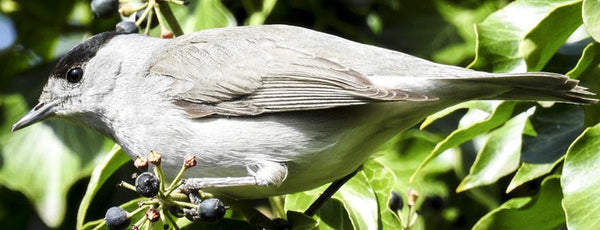The Blackcap (Sylvia atricapilla) is quite a chunky bird and is about the size of a Chaffinch and heralds from the warblers’ family. It is a distinctive greyish warbler, and both the male and female have pale grey plumage with darker grey upper parts but the male has a black cap distinguishing it from the female with a reddish-brown cap.
The Blackcap is famous for its warm, musical fluting notes which have earned it the name “Northern Nightingale”.
They are known as one of the hardiest of the warblers and are capable of enduring very cold spells of winter. The population of Blackcaps have increased over the last few decades and it overwinters in many parts of Britain, visiting garden feeders in search of food.
The Blackcap is a lover of towns and cities and prefers to visit parks and gardens can be found in most places of the UK. They can be very bossy and quite aggressive with other birds when feeding in the garden.
Their diet is varied being particularly insectivorous during the breeding season but turning to fruit and berries as they become available; they are avid eaters of the mistletoe berry - common towards the end of autumn and throughout winter.
When it comes to supplementary food offerings in the wildlife garden, they will take mealworms when offered on the bird table and seem to enjoy the benefits of high quality soft food – in particular Prosecto Insectivorous & Fat Robin Mix.
Prosecto Insectivorous is an all-year-round soft food mix for insect eating birds. It’s wholesome and nutritious plus rich in natural calcium (Ca) and contains fruit plus oils and Bakers' Honey. Insect-eating birds love this protein-rich mixture.
The Fat Robin mix is also a nutritious soft food blended together with high-energy suet pellets and ever-popular, high-fat Sunflower Hearts plus vegetable oils and raisins.
Both of these mixes are a great way to attract Blackcaps to the bird feeding station if they’re already in the area. Experiment with different feeding styles such as a soft-food feeder, ground feeder and a bird table. You’ll soon see which your Blackcaps prefer.
If you are lucky enough to see a Blackcap in your garden, you may notice that they are very lively species, with an air of elegance and they’re an absolute delight to have around. Enjoy watching them and learn more about their behaviour by watching their comings and goings this winter.

Written by Tina Jakes


